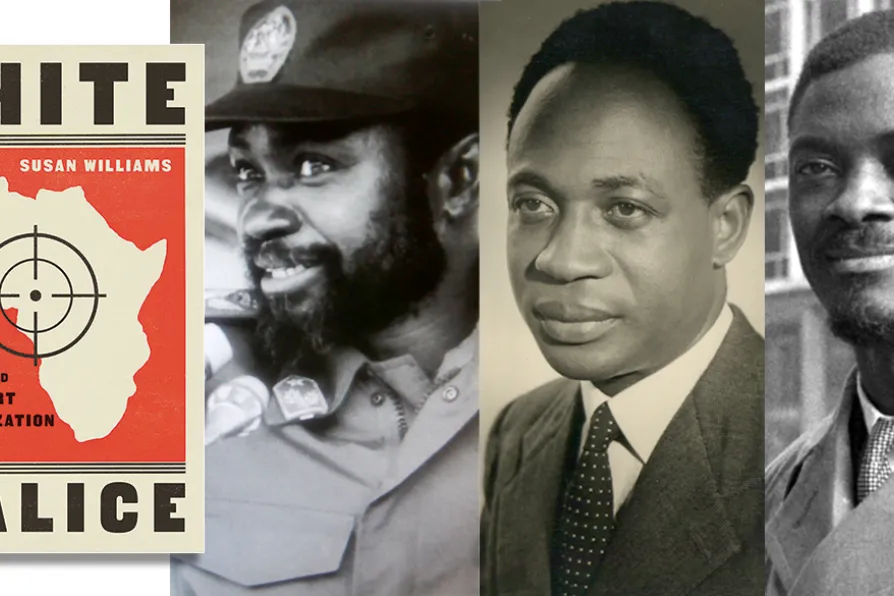New releases from Van Morrison, Tyler Ballgame, and Dry Cleaning

 ANTI-COLONIALISTS: Zamora Machel, Kwame Nkrumah and Patrice Lumumba
[Harry Pot/Anefo/CC;The National Archives UK/CC;JusticeNyathi/CC]
ANTI-COLONIALISTS: Zamora Machel, Kwame Nkrumah and Patrice Lumumba
[Harry Pot/Anefo/CC;The National Archives UK/CC;JusticeNyathi/CC]
White Malice - The CIA and the neocolonisation of Africa.
Susan Williams, Hurst, £17.99
RECENT reports from Niger demonstrate that political events in Africa are still significantly influenced by the efforts of former colonial powers and the US to control vital resources, in particular uranium, which remains crucial to the generation of electricity and the nuclear weapons industry.
Imagine how much more important uranium was, seen through the eyes of the US at the height of the cold war in the 1950s and ’60s. Susan Williams leaves little to the imagination in examining the diabolical actions of the CIA in pursuit of US policy with particular reference to newly independent Ghana and the Congo.
Williams paints an exciting picture of the heady days of independence for Ghana quoting Nkrumah’s speech of “just sixteen words” at its independence ceremony: “At long last the battle has ended and Ghana our beloved country is free for ever.” Sadly Nkrumah’s vision of a United States of Africa was destroyed by the actions of the CIA on behalf of the “other” United States which had, through its defeat of British colonialism, been his early inspiration.
Nkrumah’s presentation at the All African People’s Conference in 1958 was an inspiration for many African independence leaders, not least among them Patrice Lumumba of the Belgian Congo.
Williams details the lengths the CIA went to in order to undermine any benefits of independence and gain control of vital resources including gold, diamonds and uranium. The latter was to be the biggest driver of US policy, particularly in the Congo.
Congo’s uranium was many times richer than the US’s other sources. Although no longer reliant on Congo’s supplies, the US was determined to prevent the Soviet Union obtaining them. The book provides evidence that the assassination of Lumumba was authorised by President Eisenhower and, although it took place the day before his inauguration, it is likely Kennedy had been briefed on this and did not object. Following several failed assassination attempts of its own the CIA supported a plot to kidnap Lumumba and hand him over to his enemies and to his inevitable death.
Williams shows that “assassination, overthrowing elected governments, sowing conflict between political groups and bribing politicians, trade unionists and national representatives at the UN” were just some of the strategies employed.
The CIA had hundreds of agents on the ground and directly armed “anti-communist” opposition forces across Africa. Millions of dollars were spent on creating educational and social organisations, publishing houses and magazines to bring potential future African leaders and influencers within their orbit. While some participants were willing collaborators, many were unknowing victims who totally repudiated this association once it came to light.
We also get a picture of the wider struggle for independence across Africa particularly in the Portuguese colonies. Once again the dirty paws of the CIA are all over this. Holden Roberto and Jonas Savimbi from Angola are identified as CIA “assets.”
Returning to where we started, Nkrumah becomes enemy number one for his widespread support for liberation movements across Africa. As with Castro, Nkrumah initially had great hopes for support from the US. Over time he came to realise that no such help was to be forthcoming — quite the opposite.
Confronted with one CIA plot after another, Nkrumah sent military officers for training in the Soviet Union. For the US this was the final proof that he was a communist stooge threatening “freedom” in Africa. Nkrumah was removed by a CIA planned and financed coup while on a mission to bring about peace in Vietnam. As a result his life was saved although he was later to die in exile of leukaemia, an illness which seems to have been the fate of several other “troublesome” African leaders.
A brief review cannot do justice to the phenomenal task which Williams has completed. This sensational book is a gripping read, a revelation even to those like me who never had any illusions about the crimes committed by the CIA in the name of “freedom and democracy.”

ROGER McKENZIE reports on the west African country, under its new anti-imperialist government, taking up the case for compensation for colonial-era massacres

The charter emerged from a profoundly democratic process where people across South Africa answered ‘What kind of country do we want?’ — but imperial backlash and neoliberal compromise deferred its deepest transformations, argues RONNIE KASRILS

The Congolese independence leader’s uncompromising speech about 80 years of European colonial brutality and injustice went round the world in 1960, and within months, he had been executed by Belgian and CIA-backed forces, writes KEITH BARLOW











